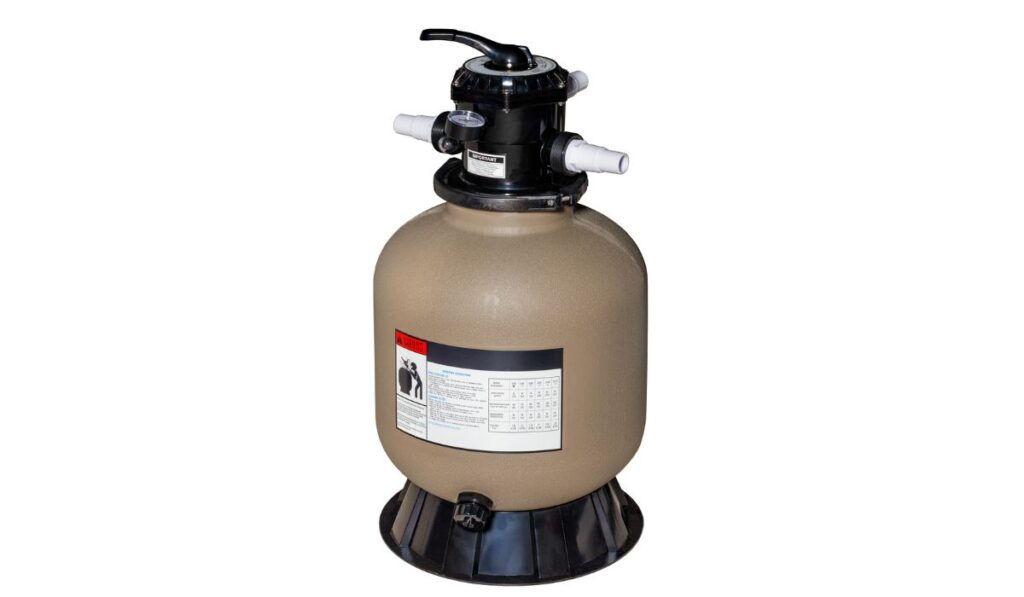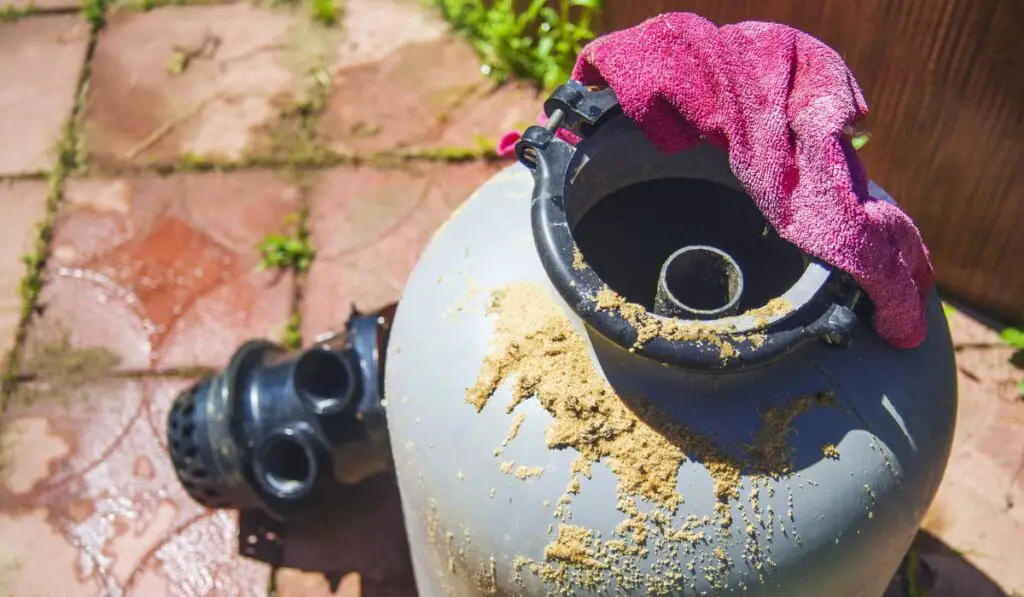Pool filter sand is one of the most expensive sand options, and if you’re trying to save on cost, you may be tempted to forgo it and use play sand in your pool filter instead. After all, they look similar. But using play sand as your filter media is a grave mistake. So, why should you never use play sand in your pool filter?
You should never use play sand in your pool filter because it’s ineffective at cleaning pool water. Its grains are smaller than pool sand’s and lack jagged surfaces to trap dirt and debris, meaning pool water passes through mostly unfiltered.
Saving a few dollars isn’t worth the potential risks you’d be facing by using play sand in your pool filter. So let’s dive right in and find out what happens if you use the wrong sand, then cap things off by looking at the type of sand you should buy.
How Does a Sand Filter Work?

A sand filter uses standard pool sand (on Amazon) as its filter medium of choice. When your pump pushes the pool water through the filter, it passes through the sand, which traps dirt and debris allowing clean water through to get pumped back into the pool.
Can You Use Any Sand in Your Pool Filter?
You can’t use just any sand in your pool filter except sand specially processed and sold for that purpose. Regular sand, whether play sand or beach sand, won’t filter out all the contaminants from your pool water, and keep it as clean as it should be.
Moreover, it’s highly likely to travel out of the filter and into the pool itself or introduce more contaminants like insects and bacteria into your pool.
What’s the Difference Between Pool Filter Sand and Regular Sand?
Pool filter sand has several features that distinguish it from regular sand. Here are some of the notable differences between them:
Size
If you examine both pool and regular sand under a microscope, you’ll notice their grains differ in size. Normal sand has smaller grains but is still big enough to see without much effort.
Pool sand has larger grains but is just the right size to fit inside your filter. Any larger and the sand won’t be able to trap the contaminants as it’s supposed to. In addition, these huge grains give the pool sand a powdery texture rather than sandy.
Color
In terms of color, regular sand tends to be a bit darker and usually has a brown or beige appearance. That’s why it’s often used in some playgrounds because it’s visually appealing and helps hide dirt, which is great when kids are constantly rolling around in it.
Pool sand, contrastingly, isn’t dark. Pool sand manufacturers make it light to help pool owners know when it’s time to replace the sand. The most common pool sand color is white, but some brands come in blue, pink, or green.
Material
Manufacturers make pool filter sand exclusively from silica, #20-grade silica, to be precise. Silica is derived from quartz and is very effective in grabbing and trapping dirt and debris and maintaining the pH. That’s why manufacturers mainly use it to make pool sand.
Regular sand has an entirely different composition as opposed to pool sand. In most cases, the percentage of silica is usually about 40, 50, or 60, depending on where the sand is from. Others are even silica free, so they contain minerals like feldspar instead.
Filtration Ability
The most distinctive feature of both types of sand is their filtration ability. Pool sand is for filter pools, meaning it can trap impurities, dirt, oils, and algae from your pool water using its jagged surface. That’s its sole purpose, and it’s very efficient at its job, filtering out around 88-99% of all pool contaminants.
Regular sand lacks that ability. It doesn’t trap contaminants as well as pool sand since its grains aren’t as pointy and grippy. So while it filters out some impurities because it’s still sand, the amount it can filter out is significantly less—around 5-10% of all contaminants, which is relatively poor.
Generally, any sand can filter out impurities to some extent. However, the water they filter out won’t be as safe as that filtered out by pool sand. Because regular sand lacks the filtration ability necessary to make your pool water clean and safe, reserving it for the playground or other purposes would be best.
Price
The final distinctive property is the price of each type of sand. Though both types won’t put a dent in your pocket, there’s still a massive difference in their prices. For 50 pounds of pool sand, you’ll have to part with between $12 to $17, but there could be other pricier options on the market.
Play sand, on the other hand, costs less. A 50-pound bag of play sand goes for around $3 to $6, roughly half the price of pool sand. Sometimes your local hardware may sell play sand in bulk, and you may get a good deal and end up paying less than you expected.
So, don’t be surprised if you hear of play sand going for as little as $10 per ton.
What Happens if You Use the Wrong Type of Sand?

To save some bucks, some pool owners have tried using play sand in their pool filters, a recipe for disaster.
Since other types of sand aren’t structurally the right size for use in pool filters, they won’t stay put in the filter. Sand with tiny grains will pass through the filter system’s laterals and leak into your pool—you don’t want to deal with such a problem.
Inversely, if the grains are too big, the sand is ineffective, and all the unwanted contaminants pass through. Additionally, other types of sand that are rougher could scratch the inside of your filter and weaken or damage it.
Regarding their functionality, other types of sand won’t work very well in your filter. You’ll most likely notice that the water coming out of the filter is cloudy. Moreover, if the sand stays in your filter for a long time, it starts to make your pool water stinky, with debris visibly floating around. The longer you let the wrong sand stay inside your filter, the worse things get.
Because regular sand has minimal filtration abilities, relying on it to filter out all the junk in your pool is a terrible idea. Using it as a filter is just as bad as having no filter in your pool. As a rule of thumb, stick to pool sand!
Which Type of Sand Should I Buy?
Pool sand, as the name suggests, is the only type of sand you should buy, as it’s the only one that works effectively. Its grains are the right size, and their jagged surface allows them to trap contaminants as pool water passes through the filter system.
Pool sand also contains silica which enables it to attract and hold pollutants in place so they don’t get back into your pool. The Palmetto Poolfilter-50 20# Grade (on Amazon) is an excellent pool sand option for all residential and commercial pool sand filters.
